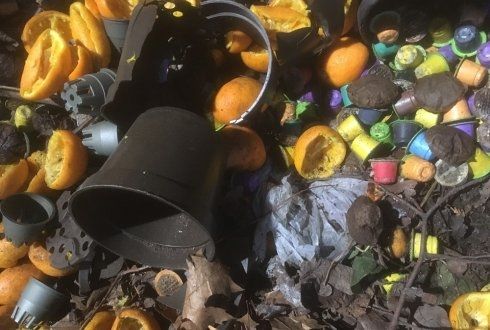Wageningen Food & Biobased Research has studied how compostable plastics behave in the current Dutch system for the treatment of GFT (i.e. source separated municipal biowaste). It came to the conclusion that compostable products can be processed well together with GFT. No compostable plastics were found in the final compost. However, conventional (non-compostable) plastics were found.
In a representative full scale practical test at one of the facilities processing GFT in the Netherlands, compostable versions of a series of plastic products were followed during the regular GFT treatment process. Nine products from different suppliers were investigated, including biowaste collection bags, plant pots, tea bags, coffee pads, coffee capsules and fruit labels. To obtain useful compost, the waste treatment process involves a sieving step, in this case after a composting cycle of 11 days, in which the remains of not fully disintegrated biowaste, together with contaminants like metals, glass, stones and plastics are separated. Besides the final compost, also the sieved fractions were analysed regarding the presence of (conventional and compostable) plastics.
Composition of the various sieving fractions
About 20% of the biowaste leaving the reactor after a composting cycle of 11 days was sufficiently small (<10 mm) to be called compost. The largest sieving fraction (10-40 mm), which was about 70% of the mass leaving the composting reactor, consisted of slowly disintegrating biowaste such as branches, leaves, peels, and paper, which is normally recirculated in the process and composted again. In this fraction, about 1% of plastics were found, which consisted almost completely of conventional fossil based plastics. Also the coarse sieving fraction (i.e. bigger than 40 mm), which was about 10% of the mass leaving the composting reactor, consisted mainly of slowly disintegrating biowaste. The plastics found in this fraction also consisted mainly of conventional fossil plastics, although some residues of compostable biowaste collection bags were recovered. When these sieving fractions are recirculated into a next composting cycle, it is plausible that the conventional plastics will accumulate in the residue fraction whereas the compostable plastics will further disintegrate.
PLA disintegrated faster than expected in the composting process
A remarkable result was that the compostable products made of polylactic acid (PLA) disintegrated faster than for instance orange peels or paper, and could not be recovered even after one composting cycle of 11 days. This was not only the case for tea bags, but also for the thicker plant pots.
Based on all observations in this study the researchers conclude that compostable products which comply with the requirements in European standard EN 13432 disintegrate fast enough in Dutch GFT waste treatment systems. Nevertheless, the presence of conventional (non-compostable) plastics in GFT is a real problem for the Dutch biowaste treatment sector and needs to be solved.
Source : https://www.wur.nl/en/Research-Results/Research-Institutes/food-biobased-research/show-fbr/Compostable-plastics-disintegrate-fast-enough-in-the-current-Dutch-Biowaste-disposal-system.htm
Packaging 360 is a comprehensive knowledge sharing ecosystem for the Indian packaging industry. Our services include an online content platform to deliver news, insights and case studies; organising conferences seminars and customised training; Providing Bespoke Project Consulting, Market Research and Intelligence.







